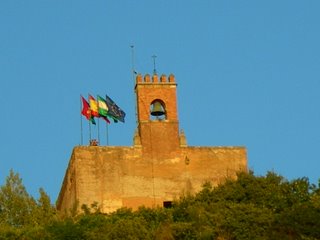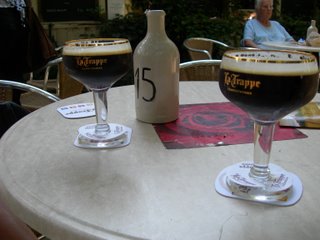
22 Sept. 2006
How has the web changed your life?
---
Where to start with an answer to the above... For one, I guess I´d be out of a job :) Further, I would not know my cousins from "down under" if it weren´t for Net effects (smile). How to answer without seeming too self-important nor overly intellectual. The latter especially since I´ve just come from a PhD thesis defence hearing, which was gratifying to view /spectate, after all, but now leaves me with a sense that i need to "elecubrar" here in some grandiose way. Okay, let´s think concretely here... How has the Web changed my life?
My sense of self, and also sense of the social is divided (sometimes almost schizophrenically) between the online and offline. Sometimes there is discord between the two types of relating and the two worlds often enough don´t connect. Even so, in spite of the latter "discord" I feel better for having real and virtual contact with my friends all over the planet.
I´ve been able to trace people using the Web; I´ve taught undergraduate classes, because of the web (thinking here of all the tech subjects); all the stuff I´ve done have been technocentric and so, more often than not, web-centric. Now that I stop to think about all of this, I wonder what I would have done career-wise if the Web had not existed... I don´t know. It is hard to say, even in retrospect.
What I do recall most of recent stuff is when I was at the ASC conference in Leiden, and I had exited during someone´s talk so that I could put on my blaser in anticipation of giving my own presentation. As I stood in the foyer, African drumbeats echoing out through the hallway (it is an African Studies Centre after all...), I turned, looked in the mirror as I put on my jacket and smiled back at myself, thinking: "How fortunate that I actually love and enjoy the work that I do."
{Blog written in the postgrad cafeteria, Edificio Luis Vives, Universidad Carlos III de Madrid, Spain}


it is friday, back wednesday from my visit to Granada. i have many thoughts re the place, but suffice to say that it was not what i expected, not in terms of the parts i knew about (the alhambra) neither in terms of the parts i´d not imagined (it´s seeming avantgarde i.e. hyper modern sensibility). in both of these aspects i was most pleasantly surprised. En fin, Granada is not what you will expect, and then some...


comments to follow later, for now, some pics only...
I am at the
ASC-CODESRIA conference in Leiden, the Netherlands. It is a get-together of mostly African Studies scholars/researchers, and for sure the theme of Open Access i.a. has been thrashed around in these past couple of days. And I am most happy to report on the
connecting-africa project (officially launched yesterday), which proves what can be done when you have, at base, an already-established network of IRs (institutional repositories). For, what the initiative is, is an aggregator research (material) locator service using OAI-PMH to harvest only African Studies-related research from IR´s the world over. The list of current data providers is available
here , and what´s also of interest are not only the indications of the quantity-subset of records being harvested in the aggregate-total number of records in disparate institutional archives, but also the figure indicating the number of African Studies experts for the institutions listed. Now, it will be obvious that the statistical data is more refined with regard to Dutch data providers (I imagine as a consequence of the, at-base, data collection effort of the DARE network), but the aim with the Connecting-Africa project is to expand the list of data providers (and so, in turn, accessible research output) to all such IRs globally which have material of interest to African Studies scholars. Already, and I am proud to see, that the
IR at Rhodes University in South Africa, is one of the data providers in the network. Shows what can be done when there is enough interest, enthusiasm, and action!! Well done to the team at the
African Studies Centre here in Leiden!
searching difficulties; too-disparate data sources
i recently had to do a research report for the Masters course in Madrid. Some would call it a mini-thesis (or tesina) but in the end I call it a report (which is what my professors called it at times). Anyhow, as I was getting down-and-dirty with legal databases I sat, on a number of occassions, on discovering the complicatedness of the research life of the legal scholar, threw my hands up in despair at times and exclaimed "THIS DOESN´T HAVE TO BE SO DIFFICULT!!!"
People get inducted into a way of doing things, and they just don´t demand more or that things be different or what. For instance, I start with
DIALNET, an online bibliographic database for scholarly works in the Spanish language. But frequently DIALNET does not link to the fulltext (it does for some, but, as luck would have it, not for many of the legal publications that I was looking for). Then, hop to my local library site at UC3M, authenticate, and search there (either in the legal databases, most of which have access to legislation & jurisprudence (cases), but not so often the doctrine). Somewhere in between all of this madness, I did use
SFX, but even with SFX functionality the search for legal doctrine was just nightmarish (in the end, many of the publications are still print-only, and so, in the library...which was closed saturdays in august).
okay, switch scenes.
so i was thinking of this little research "trip" when watching a bit of
Crossing Jordan the other day. See, they were looking for a particular area where girls had been sequestered, and in this very easy search the investigator had a geographic map, one-click, the map o/t neighbourhood, and next click, overlay map of water works needing some kind of treatment, next click, map of areas where a particular type of pine tree unknown in that area had been planted. Voila! It was sooooooo simple! Of course, this is television, how could it not be simple! But, looking at the ease with which those rather refined layers of info had been placed one atop the other, I thought, why could my legal research work not have been as easy?
And I was reminded of all of the above when I saw a reference to the
Information Commons.
"The Information Commons unites all the facts and figures of the world into a resource available to everyone. Through a massive peer-to-peer network, the Commons enables individuals, non-profits and government agencies to fuse their data together into one database, distributed across many different computers. Sharing data in the Commons is seamless between individuals and organizations, offering easy, flexible data integration and reuse."
I have no personal experience of this network so cannot comment, but for now, "seamless" seems like something close to nirvana. or maybe "godot"(???)
to the folks in mzansi
yes, to the folks south of the equator:
happy first day of Spring!
it´s the infrastructure, stupid...
See, now i keep harping on about this (more so in my
talks than this blog) is that the OA scholarly communications camp needs to work with, & add their weight to the bandwidth camp when we want to speak of OA in Africa (to date these two "worlds" exist in separate spheres). See, we cannot separate the two when speaking of OA in Africa, or in the developing world, but especially in Africa. What we also cannot do is wait for the b/w camp to play catch-up while we twiddle thumbs and watch how the rest of the world "goes OA". No, with the little b/w we do have (this "littledom" is due to lack of physical infrastructure and/or the exhorbitant cost of connectivity in Africa) we still need to "go OA".
But, so thinking along the lines of the importance of infrastructure, the following caught my eye in a recent issue of Fortune magazine (dated 28 August) We won´t go into the problem with my Fortune subscription since having moved to Spain. It is a long story, but suffice to say that the folks at the subs HQ in Amsterdam seem to have extreme difficulty with the Spanish language and getting the address format right, etc. Okay, so, the article "The future of computing (part one)". Some excerpts:
"Most people don´t think of it this way, but the Information Age is being built on an infrastructure as imposing as the factories and mills of yore....To handle this change [of software becoming webified], Internet companies are building their own [data] centers..."
And what data centers need are:
- ground, acres and acres of it
- electricity, not only to operate the servers but also to cool all those processors chugging away (e.g. "...for every dollar a company spends to power a typical server, it spends another dollar on a/c [air-conditioning] to keep it cool.")
- water, for cooling purposes, as increasingly alternative means are being explored to keep server farms cool.
moral of the story?- even in the information age, we come back to the same basic ingredients for the infrastructure needed at base.
- seriously, where does this leave Africa in the race to be part of the Info Age?
greater moral of the story?
we are running low on fossil fuels, and water, on the planet (among other things, admittedly). the info age was supposed to signifiy a reduction in the demand for either of the two. instead, demand is only increasing. so, where does that leave us, after all?









